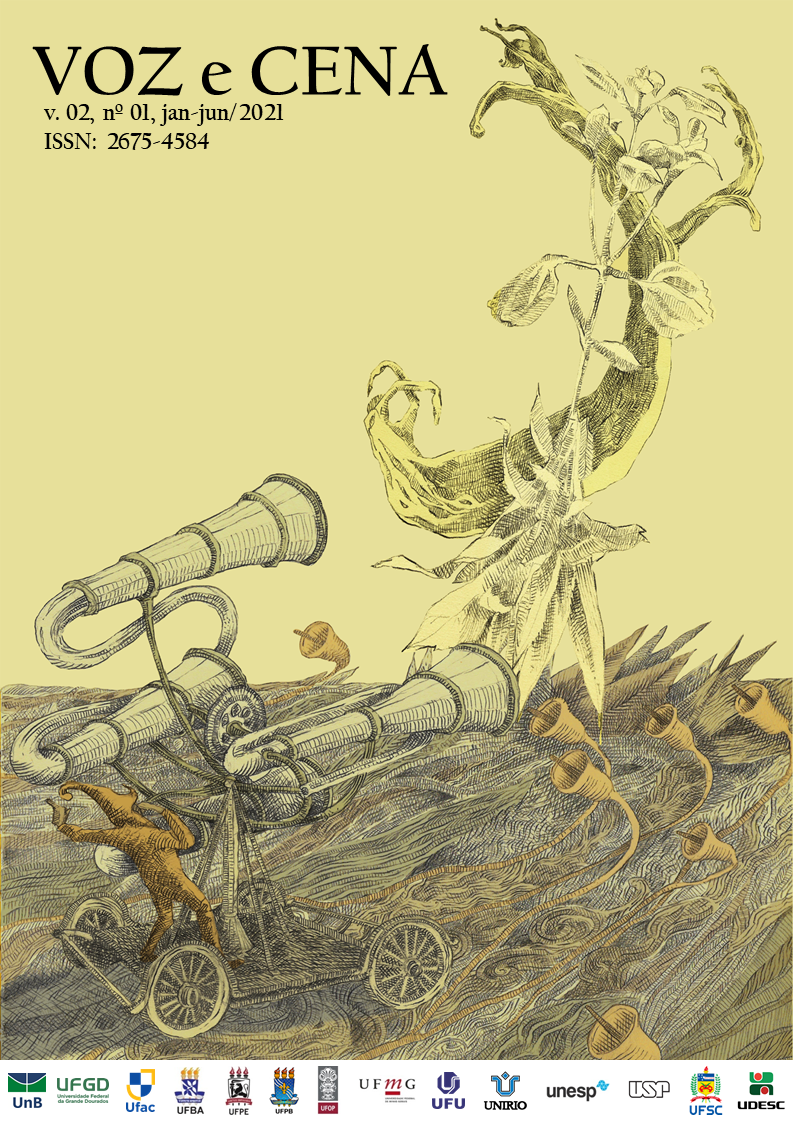From Imagination to Voice
Affective Interiority and Embodiment in the work of Voice Direction with the Actor
DOI:
https://doi.org/10.26512/vozcen.v2i01.37552Keywords:
Voice direction, Affective interiority, Embodiment, Mental imagery, InsightAbstract
This paper proposes a reflection on how the mechanisms of embodiment and affective interiority, mental imagery and emotion, simulation and memory, encounter and empathy, may establish a circuit of successive contaminations towards the effective activation of the expressive voice and its salience through the dramatic text, from the perspective of the relationship between the voice director and the actor. Based on the principles of embodied cognition, a defense is made for the collaborative contribution that this relationship may add to the creative processes on stage, by integrating word and text with its mental imagery, in a shared sensorial strengthened flow, and, therefore, promoting the emergence of insights that the body can then, effectively, voice out.
Downloads
References
ABEL, Marcos Chedid. O Insight na Psicanálise. Psicologia, Ciência e Profissão. Nº23, vol. 4, pp. 22-31, 2003.
ARIETI, Silvano. Creativity: The magic synthesis. New York, Basic Books, 1976.
AUSTIN, John Langshaw. How to do Things with Words. In: AUSLANDER, Philip (ed.) Performance. Critical Concepts in Literary and Cultural Studies. London & New York, Routledge, 2003, vol. I, pp. 91-98.
BARSALOU, Lawrence. Grounded Cognition. Annual Reviews of Psychology, nº 59, pp. 617-645, 2008.
BELO, Sara. As especificidades da voz do actor no legado das professoras Natália de Matos e Maria João Serrão. Revista Alicerces, vol. 6, pp. 27-46, 2016. Repositório Científico do IPL. Imprensa Politécnico de Lisboa.
BERTINETTO, Alessandro. The role of Image in Fichte’s Transcendental Logic. In: LEJEUNE, Guillaume (ed.). La question de la logique dans l’idéalisme allemande. Georg Olms Verlang, Hildesheim, Zurich, New York, pp. 95-108, 2012.
BISOL, Benedetta. Corpo e corporeidade no pensamento de J. G. Fichte. Revista de Filosofia Moderna e Contemporânea. Brasília, vol. 2, nº 1, pp. 20-33, 2014.
BRECHT, Bertolt. Poemas. Lisboa, Editorial Presença, Coleção Forma, 1976.
DAMÁSIO, António. O Livro da Consciência. A Construção do Cérebro Consciente. Lisboa, Temas e Tebates, Círculo de Leitores, 2010.
DAMÁSIO, António. O sentimento de Si. O Corpo, a Emoção e a Neurologia da Consciência. Lisboa, Publicações Europa-América, 2000.
DARWIN, Charles. A expressão das emoções no homem e nos animais. Lisboa, Relógio D’Água, 2006.
DECETY, Jean; GRÈZES, Julie. The power of simulation: Imagining one’s own and other’s behaviour. BrainResearch, vol. 1079, pp. 4-14, 2006.
FAUCONNIER, Gilles; TURNER, Mark. The Way We Think: Conceptual Blending and the Mind’s Hidden Complexities. New York, Basic Books, 2002.
FICHTE, Johan Gottlieb. Fundamento do Direito Natural Segundo os Princípios da Doutrina da Ciência. Lisboa: Fundação Calouste Gulbenkian, 2012.
FRAZZETTO, Giovanni. Como Sentimos. O que a neurociência nos pode – ou não – dizer sobre as nossas emoções. Lisboa, Bertrand Editora 2014.
GALLESE, Vittorio– Embodied simulation: From neurons to phenomenal experience. Phenomonology and the Cognitive Sciences, vol. 4, pp. 23-48, 2005.
GIL, José. A Imagem-Nua e as Pequenas Perceções: Estética e Metafenomenologia. Lisboa, Relógio d’Água Editores, 2ª edição, 2005.
GIL, José. O Espaço Interior. Lisboa, Editorial Presença, 1993.
KANDINSKY, Wassily. Sobre a questão da forma. Gramática da Criação. Lisboa, Edições 70, pp. 13-37, 1970.
KOHLER, Wolfgang. The Mentality of Apes. Nova Iorque, Harcourt, Brace & World Inc., 1925.
LADYMAN, James; ROSS, Don. Everything Must Go: Metaphysics Naturalized. Oxford, Clarendon Press, 2007.
LAKOFF, George, JOHNSON, Mark. Metaphors We Live By. Chicago, Univ. Chicago Press, 1980.
LAKOFF, George, JOHNSON, Mark. Philosophy in the Flesh: The Embodied Mind and Its Challenge to Western Thought. New York, Basic Books, 1999.
LANGER, Susanne Katerina. Speculations on the Origins of Speech and Its Communicative Function. Philosophical Sketches, Baltimore - Johns Hopkins, pp. 26-53, 1962.
LEDOUX, Joseph. Synaptic Self: How Our Brains Become Who We Are. New York, Penguin Books, 2002.
MASCARENHAS, Aristeu. Bergson e Kant: o problema do tempo e os limites da intuição. Trans/Form/Ação, vol.40 nº 2, pp. 103-124, Universidade Estadual Paulista, Departamento de Filosofia, abr./jun, 2017.
RODRIGUES, Danielli. A Voz na peça Radiofónica de Artaud e sua Linguagem Subversiva Marginal. REVELL – Revista de Estudos Literários da UEMS – Ano 5, vol.1, nº 8, 2014.
SADOSKI, Mark. Imagination, Cognition and Persona. Rhetoric Review, vol 10, nº 2, pp. 266-278, 1992.
SANDLER, Joseph; DARE, Christopher; HOLDER, Alex. O Paciente e o Analista – Fundamentos do Processo Psicanalítico. Rio de Janeiro, Imago Editora, 1977.
STANISLAVSKI, Constatin. A Preparação do Ator. Rio de Janeiro, Civilização Brasileira, 19ª Edição, 2003.
Downloads
Published
How to Cite
Issue
Section
Categories
License
Copyright (c) 2021 Voz e Cena (Voice and Scene)

This work is licensed under a Creative Commons Attribution 4.0 International License.
Readers are free to download, print and use the articles published in the journal, as long as there is always explicit mention to the authors and to the Voz e Cena journal and that there is no change in the original work. Any other use of the texts must be approved by the authors and the journal. By submitting a paper to Voz e Cena journal and having it approved, the authors agree to assign, without remuneration, the rights of first publication and the permission for the journal to redistribute that article and its metadata to the indexing and reference services that its publishers deem appropriate.
This work is licensed under a Creative Commons Attribution 4.0 International License.![]()


7.PNG)


